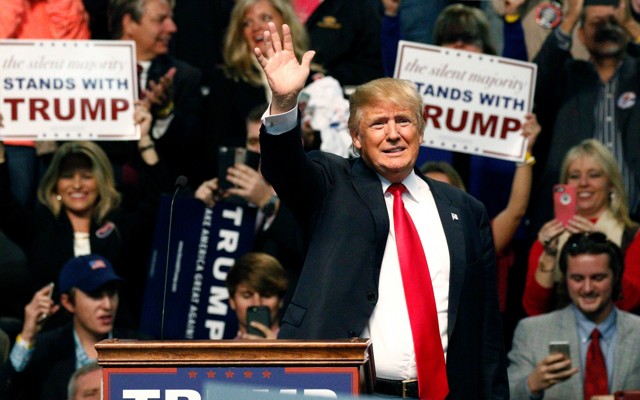In a piece in The Atlantic, Ronald Brownstein reports that Donald Trump today is much more popular among Republican voters than he was several months ago. However, he remains widely unpopular among Democrats and independents, and were he to win the Republican nomination his inability to gain the votes of non-Republicans would likely lead to his defeat:
A widening distance between perspectives about Donald Trump among Republicans and all other voters—the “Trump gap”—presents GOP leaders with a conundrum as the primaries approach. The phenomenon can be charted across a series of national polls, from which a consistent pattern has emerged in attitudes toward the GOP front-runner since he entered the race last summer.
Republican partisans and some other conservative-leaning constituencies are demonstrably warming in their attitudes toward the blustery business executive. But views of Trump generally remain stagnant, or are even deteriorating, among adults who identify as Democrats or independents.
While Trump’s inability thus far to please non-Republicans looks costly, the leading Democrat, Hillary Clinton, has her own favorability problems, though they are not as bad as Trump’s:
What makes this pattern especially fraught for GOP strategists is that Hillary Clinton, the overwhelming favorite for the Democratic nomination, also faces very sticky negative perceptions among voters outside of her partisan base. Yet for all of Clinton’s difficulties with independent voters and other swing constituencies, Trump’s standing among the same groups usually ranks lower in the same polls.
Brownstein reports that Trump has been increasing his popularity among GOP voters:
The magnitude of the change among Republicans is even more apparent when considering Trump’s net favorability: that is, the difference between the share of Republicans who view him favorably and unfavorably. In the CNN/ORC poll, Trump’s net favorability has jumped from 9 to 43 percentage points; in Quinnipiac polls, he’s moved from a net negative rating of 18 points to a net positive of 33; and even in the NBC/WSJ survey, his net positive rating has nearly tripled from 9 to 25 percentage points.
Because Hillary is hardly beloved, the contest in November may come down to which candidate can get his or her voters to show up in the polls, while those who don’t like either choose the lesser of two evils:
A race between two candidates laboring under such cloudy public assessments might turn on which could do more to reverse the negative judgments evident today. But it might also prove a uniquely negative and bruising contest decided by which contestant can more effectively reinforce the gap between their opponent’s strong standing among their partisans—and far more tenuous position with everyone else.


No comments:
Post a Comment